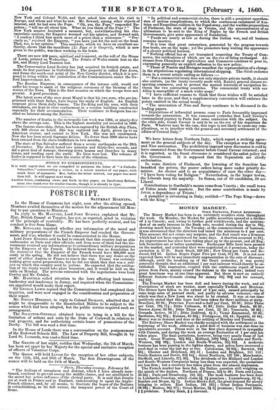"Paris, Thursday evening, February 2d. "The feelings of uneasiness and
distrust, which I have already men- tioned, continue to prevail among the middle classes, and are attributed to the secret but active influence of the clerical party. It is said that Jesuits are at work in France and in England, endeavouring to upset the Anglo- French alliance, and, by all means, to frustrate the hopes of the Italians in reistablishing, to its full extent, the temporal power of the Court of Rome. "In political and commercial circles, there is still a persistent apprehen- sion of serious complications, to which the continuous enlistment of Aus- trian and Neapolitan soldiers in the Papal army, and the warlike preparations of Piedmont, the state of siege in Verona, and the announcement of an ultimatum to be sent to the King of Naples by the French and British Governments, give some appearance of foundation. "Funds are nearly as low as during the Italian war, and all business remains inactive.
"it is true that great enterprises, generated by the progress towards free trade, are on the tapis ; yet the promoters keep waiting the appearance of a clearer political horizon. "Nothing official has as yet transpired respecting the Treaty of Com- merce, the ratifications of which are on the eve of being exchanged. Ad- dresses from Chambers of Agriculture and Commerce continue to pour in, expressing generally an explicit adhesion to the new policy. "Those of Nantes and Bretagne manifest the representation of a change in the stipulations regulating international shipping. The Siècle endorses them in a recent article ending as follows :— " ' But a commercial treaty does not only stipulate private tariffs, it should also contain, (as the treaty recently made with Russia) general clauses re- specting commerce, and to protect the mutual interests of navigation be- tween the two contracting countries. The commercial treaty with our Allies is susceptible of a much wider scope.'
"I have sufficient reasons to think that these wishes will be satisfied - later in the year' and that a supplementary convention will embrace the points omitted in the actual treaty.
"The annexation of Nice and Savoy continues to be discussed in the leading papers. "Deputations of influential persons come to Paris favourably impressed towards the annexation. It was rumoured yesterday that Lord Cowley's contemplated journey to Paris had some connexion with the subject. On the other side, Count Cavour is said to be on the eve of his departure for Paris. Whatever may be the case, this topic is not likely to cause any com- plications, or to interfere with the general and necessary settlement of the affairs of Central Italy."


























 Previous page
Previous page